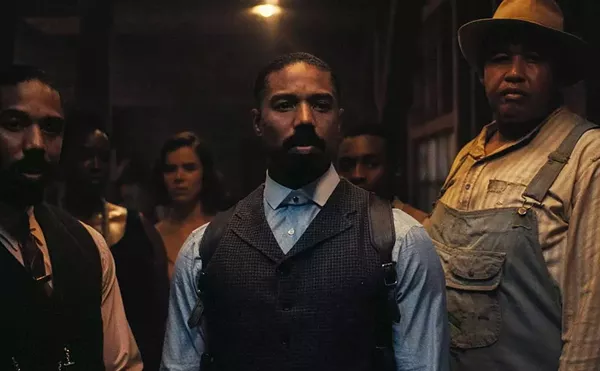
Audio By Carbonatix
[
{
"name": "GPT - Leaderboard - Inline - Content",
"component": "35519556",
"insertPoint": "5th",
"startingPoint": "3",
"requiredCountToDisplay": "3",
"maxInsertions": 100,
"adList": [
{
"adPreset": "LeaderboardInline"
}
]
}
]
Seventeen-year-old boys are like puppies with fully functioning libidos, equipment included. They have unfathomable energy with relentless one-way minds and mouths that think and breathe sex: How to get sex, watching sex on TV, the last time they had sex, is it time for hand-sex? It’s a male age-condition that seems to be a worldwide epidemic, Mexico included, and it’s the driving instinctual force of Y Tu Mamá También (And Your Mama, Too).
Directed by Mexico City native Alfonso Cuarón (Solo con tu Pareja, A Little Princess), the film has been extolled as a “sexy road movie,” and that it is, steaming immediately with unbridled teen sex in Tenoch’s girlfriend’s bedroom. Tenoch (Diego Juna) and Julio (Gael Garcia Bernal) are 17-year-old best friends who from the sound of their conversations could be from anywhere, but these two live in Mexico. When their girlfriends take off to Italy for summer holiday, the boys are terrified of having a boring summer, so they amuse themselves by plotting ridiculous sexual exploits which end up in nausea, fart wars, swimming in the pool by themselves, lying on the diving boards and jacking off in stereo.
The two are so much alike, their words and actions are interchangeable, and they work as a team when they approach Luisa (Maribel Verdu), an older, exotic Spanish woman married to Tenoch’s full-of-himself cousin. She initially brushes off the boys’ attempts to woo her off to an imaginary beach, but when her real, adult life becomes too much to bear, “heartbreaking news” turns into “she’s got nothing to lose,” and she leaves with the boys to find herself. Luisa starts out as a sexual object, empowered by the desire of duo-engined, sight-triggered teenage lust, but despite her sexy shell, her additional life experience causes her to slip into a mother-teacher role as well. It’s totally up to her to drive the boys in either direction, even if it means sexual anarchy on the road.
The script, written by Alfonso Cuarón and his brother Carlos, is what it was meant to be, an honest and realistic verbal and sexual intercourse from a teenage perspective within a country Cuarón considers to be in its own adolescence.
But we’re in confident hands with Cuarón as director. He’s not content to focus his camera inside the car from profile to profile, which means death to a story line on the move. Instead the lens moves as the fly flies, in and through the station wagon, out the window and past what’s up ahead beyond the next car. Or it follows an old lady, beyond the table with the boys and Luisa, back into the Mexican kitchen where the ladies dance with themselves as they cook and clean. Cuarón imbibes the film with a “curious” personality, which turns into an exploration on multiple levels.
Periodically the sound is completely cut, and an all-seeing voice speaks of things beyond what’s immediately apparent. It’s an ominous strategy influenced by the French New Wave films of Jean-Luc Godard. Each silent segment functions like a finger working its way inside and beyond a situation, fanning the film out into another contextual level altogether. As the three drive down the road, we may hear about a gruesome accident that happened previously that had strewn dead chickens and bodies on the very same stretch of road. Or we may find out about the hapless fate of a group of tent-raiding pigs as they wiggle away down the beach. The effect successfully anchors the teenage-driven plot of freeborn self-liberation to a cause-and-effect reality.
But cars break down and illusions do too. There’s no better medicine to build and test a true friendship than to spend hour after hour in a hot, steamy station wagon headed for an unknown destination with only each other to rely on. Y Tu Mamá También is a moment-to-moment, alive with life, sex-on-the-road-trip that hints at the very real repercussions of an immediate reality.
Be careful of your sexual fantasies: Your musings may come true and you might not be equipped to live the rest of your life remembering them.
Anita Schmaltz writes about the arts for Metro Times. Send comments to letters@metrotimes.com.





